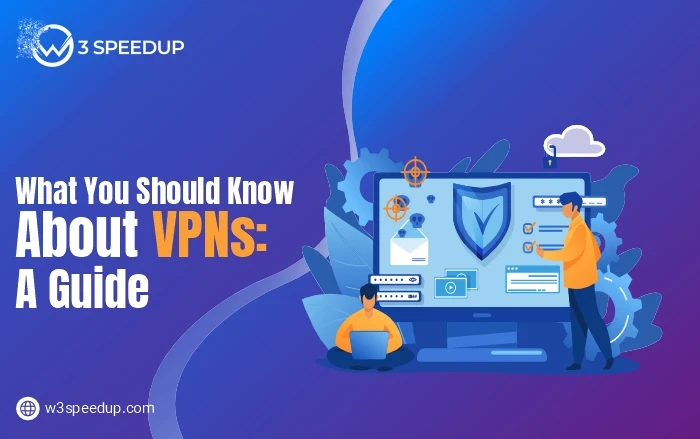Growing security concerns, a greater appreciation for one’s private data, and the shift toward region-based services have caused VPNs to soar in popularity. It’s unlikely you haven’t heard of VPNs, and you may have a vague idea of what they do but aren’t sure you need one.
This quickstart guide has all the info you need to get an appreciation for what a VPN can do for you. Read on to find out what VPNs are and why investing in one is smart regardless of what you use the internet for.
Here is Complete Guide About VPN
1. What Is a VPN?
A virtual private network is a cybersecurity technology designed to improve users’ online privacy and anonymity. Its main purposes are to conceal online activity from ISPs and hackers and allow unrestricted access to content from around the world.
2. How Does It Work?
You first need to install a VPN client onto the devices you want to secure. The client connects to the internet through your service provider but encrypts the connection with a tunnel first. The encrypted data first reaches one of the provider’s servers. It’s then decrypted and proceeds to the original destination. Any data sent back undergoes the same routing procedure, arriving safely at your device.
Competent VPN providers offer clients for all major operating systems and device types. Alternatively, you can install more lightweight browser extensions for a more focused and streamlined experience. However, keep in mind that these extensions only encrypt your browsing.
3. Why Does This Matter?
Not using a VPN opens you up to different risks and inconveniences. For example, your ISP automatically knows your approximate location, which websites you visit, and what data you download or upload. They store such information and can give it up to authorities if asked. There are several problems with this you may have an issue with.
On the one hand, your ISP may block certain content or impose data caps to discourage users from visiting certain sites. This is sometimes justifiable, e.g., preventing users from downloading illegally shared content. However, it can also be a repressive measure authoritarian regimes use to spy on citizens or restrict their access to information the state sees as dangerous.
On the other, some ISPs sell browsing data to advertisers. Couple that with third-party cookies Google has yet to get rid of, and you’ve got a sophisticated tracking method for targeted advertising. You might not mind such advertising. Still, companies that benefit from it may have lots of data on you while possibly lacking the proper cybersecurity measures to protect it from breaches.
VPNs mitigate these concerns by masking your IP address and encrypting online activity. They’re also an indispensable security measure if you use public Wi-Fi since they effectively prevent anyone snooping on such networks from taking advantage of you. They (or your ISP, for that matter) can detect a data exchange is happening. Yet, encryption turns any information they might intercept into useless nonsense.
Finally, VPNs are popular for bypassing geographic restrictions, like accessing streaming service content unavailable in your country. A VPN server might be closer than your ISP’s, causing online games to lag less. Setting a different virtual location can also help you buy cheaper products, tickets, or accommodations. Be sure to check if using a VPN complies with the ToS first, though.
4. How to Choose a Good VPN?
The ongoing debate refers to whether you should choose a free VPN vs. a paid VPN. Yet, the debate solves itself once you learn how dangerous free ones can be. A free VPN might offer location switching, but it has to cover server costs somehow. In such cases, you are the product. Free VPNs regularly sell user data. Some have even sold users’ bandwidth to third parties that used it for botnets and malware distribution.
Paying for a VPN finances its infrastructure and running costs. It’s in VPNs’ best interest to guarantee user privacy, so the best ones use state-of-the-art encryption. When choosing one, make sure both customers and independent auditors find the service satisfactory. Your VPN should also have a no-logging policy, meaning it neither collects nor stores any information on your activities.
5. Do VPNs Provide Complete Protection?
A VPN makes maintaining one’s online privacy easier, but it’s not the only cybersecurity precaution you should employ. For example, VPNs can’t help if you’re careless enough to download malware or fall for a phishing scam.
Comprehensive security has several layers. The VPN can handle privacy concerns, while an up-to-date OS and antimalware protect from cyberattacks.
You should also start using a password manager to secure your logins. It effortlessly replaces old – samey and possibly compromised – passwords with complex and unique ones. Advanced password managers also offer multi-factor authentication, reducing the impact of data breaches on account safety. To find the most suitable one for yourself, check out the password manager comparison table on Reddit.
Conclusion
Whether you’re looking for a more private online experience, regularly accessing work-related resources remotely, or just want to continue watching your shows while on vacation abroad, VPNs are an elegant and comprehensive solution. Do some research, pick a favorite, and improve your online life with minimal effort.
 Christmas Mega Sale – Enjoy Up to 50% OFF on Every Plan!
Christmas Mega Sale – Enjoy Up to 50% OFF on Every Plan! 



